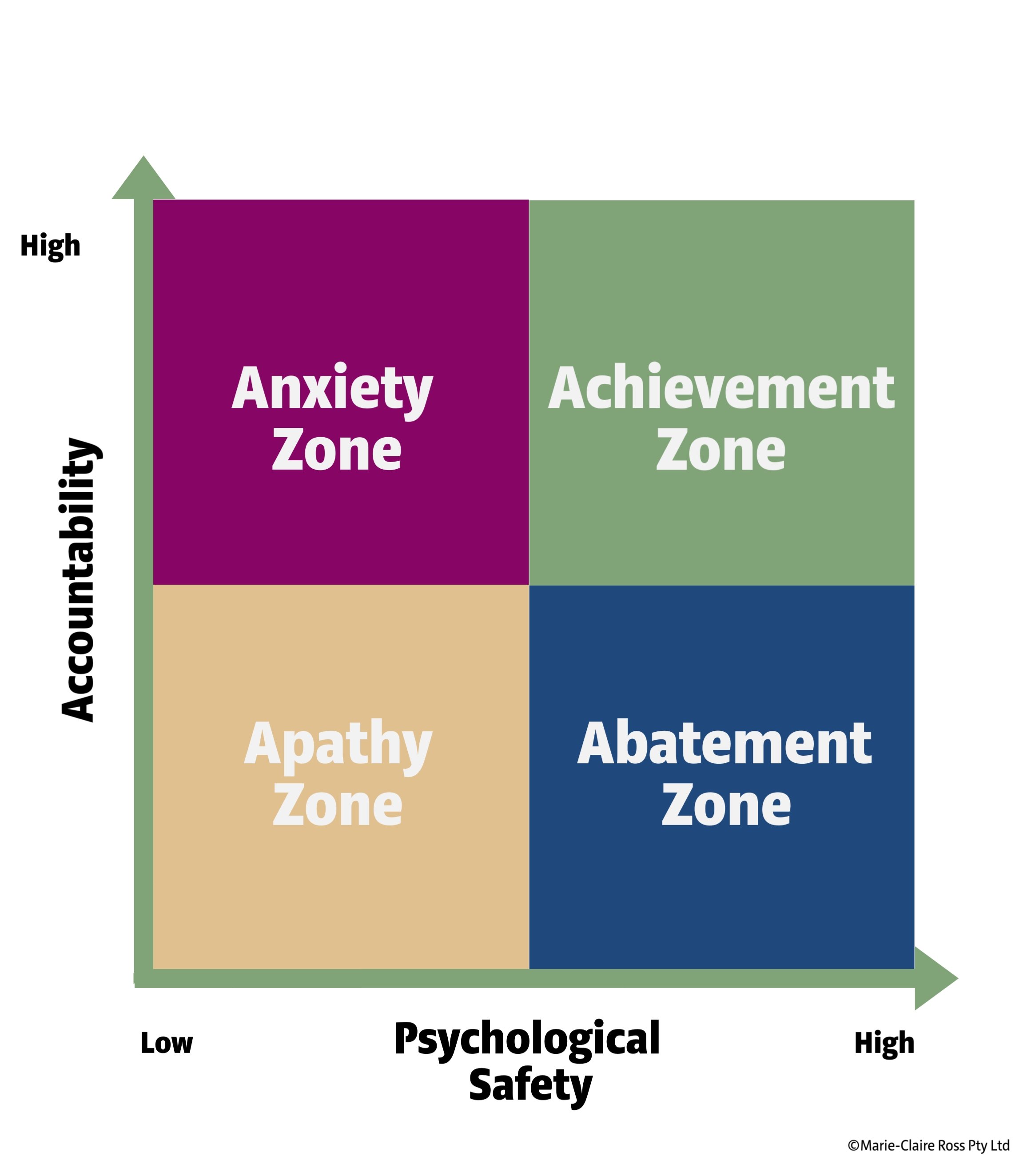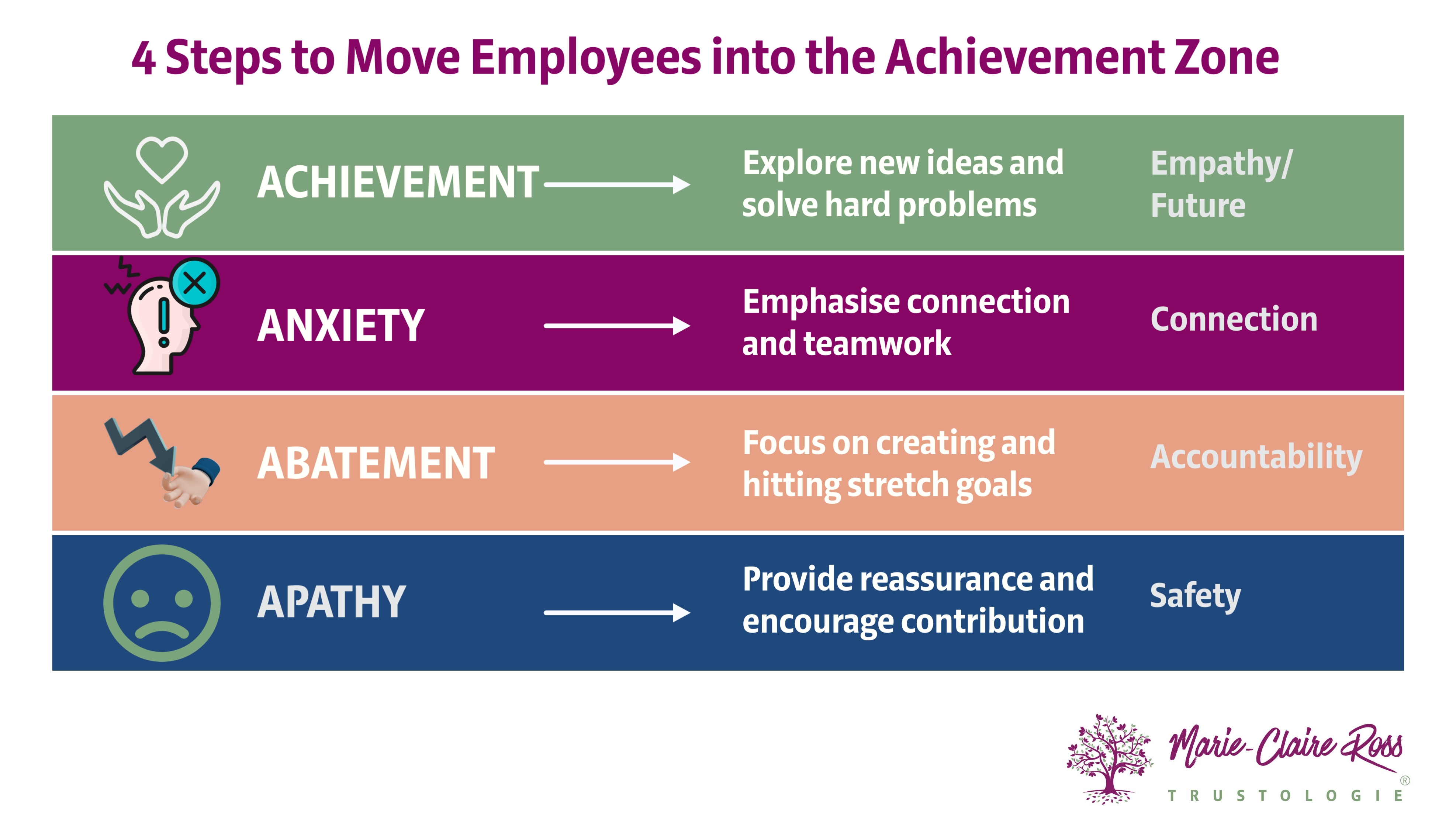11 min read
4 Practical Strategies for Better Emotional Management in the Workplace
I have a friend who often finds herself at the mercy of her emotions. Recently, she called me to rehash a confrontation she’d had with a group of...
Develop leaders, strengthen executive teams and gain deep insights with assessments designed to accelerate trust and performance.

Transform how your leaders think and perform with keynotes that spark connection, trust and high-performance cultures.

Explore practical tools, thought-leadership and resources to help you build trusted, high-performing teams.

Trustologie® is a leadership development consultancy founded by Marie-Claire Ross, specialising in helping executives and managers build high-trust, high-performing teams.

3 min read
Marie-Claire Ross : Updated on October 31, 2023

|
Ask any secondary school student in their final years of schooling, what they need to do to achieve high grades and they will tell you that you have to study really hard. That the more effort you put in, the better your results.
From an early age, we are taught that achieving greatness means pushing ourselves under immense pressure. We are led to believe that we must sacrifice our social lives and relaxation in order to succeed in life.
We enter the workforce where the pressure to perform is not only greater than our school years, but expected for longer periods of time. Calling yourself a workaholic is considered a badge of honour.
But this out-dated belief we received in childhood does not serve us.
Studies have proven that pushing oneself to the maximum and maintaining 100% effectiveness throughout the day is ineffective.
A comprehensive study conducted by City University in London examined the professional trajectories of over 50,000 individuals across various industries.
Surprisingly, the study revealed that putting in extra effort in terms of hours and intensity did not yield significant benefits in terms of career progression or income for both employees and leaders. In fact, it resulted in a decrease in the quality of output, as it led to a higher likelihood of burnout rather than success.
So what does work?
Applying 85% effort, rather than 100%. Counterintuitively, this can be key to preventing burnout and achieving more sustainable outcomes.
The same City University study found that by limiting the duration and intensity of work, individuals were able to achieve better results.
Interestingly, the 85% concept originates from studying successful sprinters such as Olympian Carl Lewis.
Lewis naturally applied the 85% rule. Instead of running at full pelt and trying to maintain the number one position throughout the whole race, he worked on relaxing his jaw, face, body and eyes, as he ran. Typically, runners will clench their fists and scrunch their face which depletes their energy. Lewis focused his energy on being calm and comfortable enabling him to gain ground on those over-exerting all their effort.
The good news is that the 85% rule can also be applied successfully to how we lead our teams and our lives.
When you're at 85 percent, when you're not pushing yourself to the absolute limit, you create space for reflection. You create space for flexibility. You create space to evaluate your own performance and engage with those around you. You're able to adapt and respond to the changing circumstances and improve your awareness of what's needed in the moment. You're able to relax and have fun. You embrace the journey - not with squinted eyes, heightened anxiety and discomfort, but with pure delight and complete mindfulness. And when you look at successful teams, they are having fun. They're not straining and stressing. They are enjoying the work of finding solutions together, innovating and achieving great results. Think back to your best team experience. Chances are, you worked incredibly hard and put in a lot of effort, but at the same time, you made time to have fun. You laughed a lot and enjoyed each other's company. It's during these moments of lightheartedness and enjoyment that true innovation and breakthroughs can occur. In what I term the Achievement Zone (teams that operate with high accountability and high psychological safety), it's the interpersonal aspect that truly sets apart the most productive teams from the rest. In fact, studies have consistently shown that the most successful teams are the ones that have the most fun, even when faced with challenging and demanding tasks. However, when we reach the pinnacle of success, it can often leave us feeling unfulfilled and questioning the true meaning of our achievements. The constant pressure to continuously strive for more can lead to exhaustion and burnout. We may assume that the problem lies solely within ourselves, but perhaps it is our approach to our careers that needs to be reevaluated. Regardless of the nature of the work, what matters most is how we collaborate and work together as a team. When we prioritise results over people, we work in the Anxiety Zone. A Zone that is high in accountability, but low in safety. In this zone, while we can perform at a high level for some time, but we make more mistakes and we are highly stressed. We feel disconnected and work can be overwhelming. Staying in the Achievement Zone long-term is rare because leaders think that high-performance is about pushing yourself and your team. In my research, I find that teams that stay in this team the longest have leaders who embrace the paradox of both happiness and productivity (if you want to learn more, you can find out about the Achievement Zone model in my book, Trusted to Thrive: How leaders create connected and accountable teams. Get a free chapter, here.)
The ACHIEVEMENT ZONE MODEL
Tips for Implementing the 85 Percent RuleSo, what does this imply for business leaders?
Consider recalibrating your expectations both for your team and yourself. Give yourself some slack. Prioritise wellbeing and working with your colleagues. Focus on what really matters and don't get hung up on the small stuff or things you can't control. Invite team members to work a little below what they perceive to be their maximum capacity.
While there may be intense periods where you need to exert maximum effort, you will ultimately achieve the best results by striving for an average of 85 percent effort throughout your days. Allow yourself and your people time to recuperate after periods of intense exertion.
And watch your language. In his HBR article, Greg McKeown says reduce unnecessarily high-pressure language like “ASAP” and “urgent” in communications.
Remember, high-quality work is a more of a fun-run, not a sprint.
The success of a team is not solely determined by the outcome of the work itself, but by the journey and experience of working and learning together.
So, the next time you embark on a project with your team, make sure to prioritise fun and enjoyment alongside hard work and dedication. Work at 85% of your capacity. The results will speak for themselves.
|

11 min read
I have a friend who often finds herself at the mercy of her emotions. Recently, she called me to rehash a confrontation she’d had with a group of...

9 min read
True leadership presence isn’t a performance or a set of charisma hacks; it is the felt experience of who you are being in the room. By cultivating...

13 min read
As teams return from their summer (or winter) break, you may notice subtle shifts in your team’s energy. Even if the end of year was positive, a new...

It can be a game-changer for leaders to look at how much psychological safety and accountability they create in their teams.

Leading a high performance team is a bit like a team leader taking their team on an exhilarating elevator ride to the 100th floor of a building.